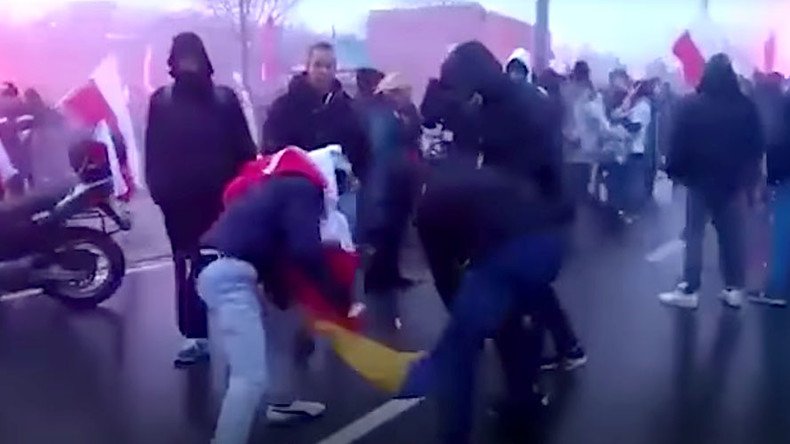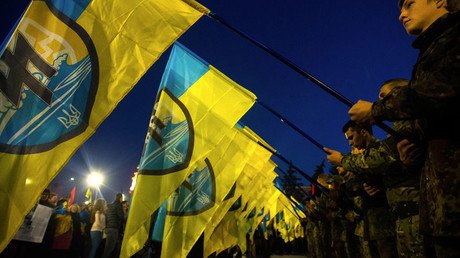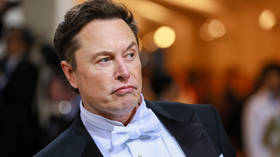‘Kremlin hand’ behind anti-Ukrainian slogans at nationalist Poles’ march – Polish ambassador

If someone shouts “Kill Ukrainians!” at a Polish nationalist march in a city that was a battlefield in a Polish-Ukrainian war, it can be nothing other than a provocation by Moscow, the Polish ambassador to Ukraine stated.
Jan Pieklo sees “the hand of Kremlin” behind an incident that took place during an annual march of nationalist youths in the border city of Przemyśl on Saturday. As the column was passing a Ukrainian cultural center, one of the participants shouted “Death to Ukrainians,” footage of the incident shows.
The local Ukrainian diaspora said that this slogan, along with others of an anti-Ukrainian nature such as “Death to Banderas” and “Przemyśl and Lwow are Polish forever,” could be heard throughout the march. The Ukrainian Foreign Ministry has filed a complaint with Warsaw, demanding an investigation into the video, which was widely shown in the Ukrainian media.
READ MORE: Polish march featuring anti-Ukrainian slogans sparks outrage in Kiev (PHOTOS, VIDEO)
Ambassador Pieklo explained his accusations implicating Russia while speaking to the media in Kiev, saying:
“The situation now is that Przemyśl is becoming a city of provocation. The mechanism is the same as Russian hybrid war. There is a demonstration; someone calls ‘Death to Ukrainians.’ Ten minutes, and the video is on the social networks. And then in the media. This is what the provocateurs want. Everybody says there is a problem in Polish-Ukrainian relations.”
“My opinion is, it’s not easy for Putin’s Russia to create a pro-Kremlin lobby in Poland and Ukraine,” Pieklo said, claiming that Moscow aims to “drive a wedge between Poles and Ukrainians through common history.”
The organizers of the march also believe there was a provocation, but they think it was initiated by Ukrainian nationalists who edited the shouting into footage of the march and released it online to spark tensions.
The Polish nationalists’ demonstration was called “March of the eaglets of Przemyśl and Lwow,” which refers to events in the Polish-Ukrainian war of the late 1910s. Both cities were previously part of the Kingdom of Galicia and Lodomeria, which was part of the Austro-Hungarian Empire. The kingdom had large Polish and Ukrainian populations, and when the empire collapsed, ethnic tensions flared into armed conflict. “Eaglets” is the term used in Poland for the young volunteers who fought for the Polish cause at the time.
Nationalism is currently on the rise in both Poland and Ukraine. Both countries have right-leaning governments that encourage developing a strong national identity to serve as a bulwark against malevolent foreign influences. However, when it comes to their shared history, Polish and Ukrainian nationalists often find themselves pitted against each other.
For example, Kiev treats Stepan Bandera and other Ukrainian nationalist leaders as national heroes, but they are loathed in Poland for massacring tens of thousands of ethnic Poles in Volhynia and Eastern Galicia during World War II. In July, the Polish parliament even passed a declaration blaming Ukrainian nationalists for those deaths – a move that angered the government in Kiev.
Many Polish nationalists want to reverse the territorial changes that came after the war and make the eastern part of Galicia, including Lviv, which is currently part of Ukraine, Polish again, thus inspiring the “Przemyśl and Lwow are Polish forever” slogan at the Przemyśl rally. Others don’t go that far, but expect Kiev to pay restitution for Polish losses.
Despite Pieklo’s claims that “there are no problems with Ukrainians in Poland,” tensions between Poles and Ukrainians are hard to overlook. In June, in the same city of Przemyśl, a group of Polish nationalists derailed a rally being staged by Ukrainians to honor the Sich Riflemen, a Ukrainian unit in the Austro-Hungarian Army that fought for the Ukrainian side during the Polish-Ukrainian war.
In 2016, there were several reports of street violence in which Polish nationalists allegedly targeted Ukrainian guest workers. Polish nationalists believe that visiting Ukrainians are stealing their jobs and driving down their salaries. Some memorials to Ukrainian nationalist fighters have been vandalized in Poland over the past few years.
READ MORE: Polish nationalists attack Russian embassy during Independence Day march
Ambassador Pieklo’s anti-Russian rhetoric is something Warsaw and Kiev currently share that both Polish and Ukrainian nationalists may sympathize with. Local nationalists in both countries have attacked Russian embassies, provoking protests from Moscow.













